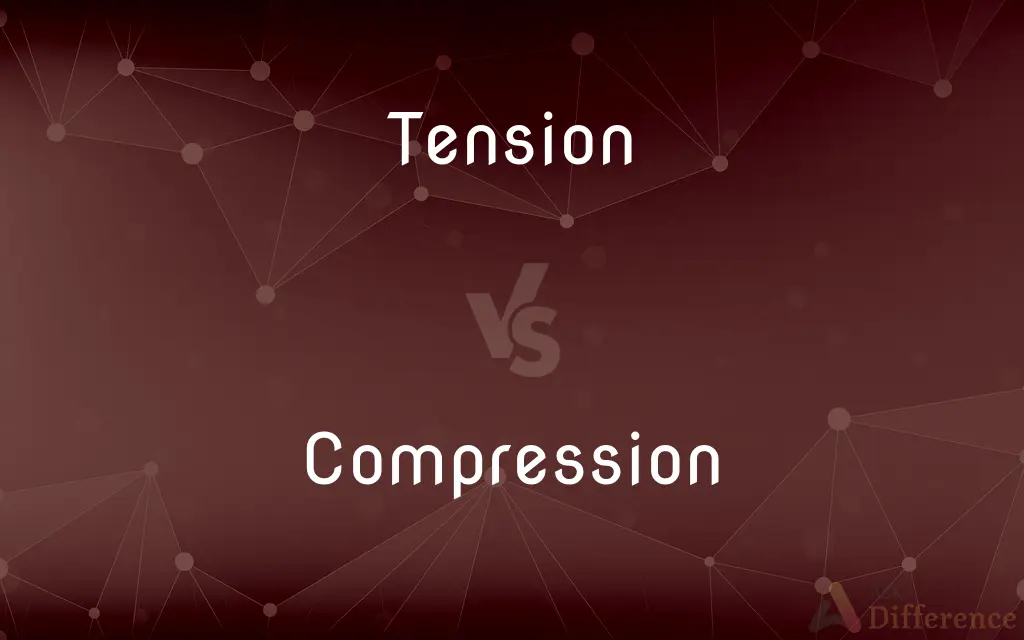Tension vs. Compression — What's the Difference?
By Tayyaba Rehman & Fiza Rafique — Updated on March 16, 2024
Tension refers to the force that attempts to elongate an object, while compression aims to shorten or compress it.

Difference Between Tension and Compression
Table of Contents
ADVERTISEMENT
Key Differences
While tension predominantly affects the length of an object by stretching, compression mainly reduces the length by squeezing. This difference in action leads to distinct structural considerations in engineering and architecture, as materials respond differently under these forces.
Materials and structures are often designed to withstand specific amounts of tension and compression. For example, bridges are engineered to handle tension in the cables and compression in the pillars, showcasing how both forces are crucial in practical applications.
Different materials have varying resistance to tension and compression. Steel, for instance, has high tensile strength, making it ideal for cables and ropes, whereas concrete, with its high compressive strength, is preferred for support structures like columns.
Comparison Chart
Definition
Force extending an object
Force compacting an object
Effect on Material
Elongates or stretches
Shortens or compacts
ADVERTISEMENT
Typical Applications
Cables, ropes
Columns, beams
Material Consideration
Requires materials with high tensile strength
Requires materials with high compressive strength
Examples
Towing a car with a rope
A column supporting a weight
Compare with Definitions
Tension
Force exerted to elongate an object.
The tension in the bridge cables increases as the weight they support grows.
Compression
Force exerted to shorten an object.
The compression of the spring depends on the weight applied.
Tension
A state of strained relationships.
There was a palpable tension between the competing teams.
Compression
A medical technique to reduce swelling.
Compression bandages help reduce inflammation in injured limbs.
Tension
A measure of such force or stress.
Engineers calculate the tension in steel cables to ensure structural integrity.
Compression
Stress from being squeezed.
Pillars are designed to withstand the compression from the structure above.
Tension
Stress from being stretched.
Rubber bands exhibit visible tension when pulled apart.
Compression
A measure of such force or stress.
The compression strength of concrete is tested for safety.
Tension
Psychological or emotional strain.
The tension in the room escalated during the debate.
Compression
Reduction in data size.
Data compression makes files easier to store and transmit.
Tension
The act or process of stretching something tight.
Compression
The act or process of compressing.
Tension
The condition of so being stretched; tautness.
Compression
The state of being compressed.
Tension
A force tending to stretch or elongate something.
Compression
The process by which the working substance in a heat engine, such as the vapor mixture in the cylinder of an internal-combustion engine, is compressed.
Tension
A measure of such a force
A tension on the cable of 50 pounds.
Compression
The engine cycle during which this process occurs.
Tension
Mental, emotional, or nervous strain
Working under great tension to make a deadline.
Compression
(Computers) The process by which data is compressed into a form that minimizes the space required to store or transmit it.
Tension
Barely controlled hostility or a strained relationship between people or groups
The dangerous tension between opposing military powers.
Compression
An increase in density; the act of compressing, or the state of being compressed; compaction.
Tension
A balanced relation between strongly opposing elements
"the continuing, and essential, tension between two of the three branches of government, judicial and legislative" (Haynes Johnson).
Compression
(automotive) The cycle of an internal combustion engine during which the fuel and air mixture is compressed.
Tension
The interplay of conflicting elements in a piece of literature, especially a poem.
Compression
(computing) The process by which data is compressed.
Tension
A device for regulating tautness, especially a device that controls the tautness of thread on a sewing machine or loom.
Compression
(music) The electronic process by which any sound's gain is automatically controlled.
Tension
(Electricity) Voltage or potential; electromotive force.
Compression
(astronomy) The deviation of a heavenly body from a spherical form.
Tension
To subject to tension; tighten.
Compression
The act of compressing, or state of being compressed.
Tension
The condition of being held in a state between two or more forces, which are acting in opposition to each other.
Compression
Reduction of the space required for storage (of binary data) by an algorithm which converts the data to a smaller number of bits while preserving the information content. The act of compressing {3}.
Tension
Psychological state of being tense.
Compression
An increase in the density of something
Tension
A feeling of nervousness, excitement, or fear that is created in a movie, book, etc.; suspense.
Compression
The process or result of becoming smaller or pressed together;
The contraction of a gas on cooling
Tension
State of an elastic object which is stretched in a way which increases its length.
Compression
Encoding information while reducing the bandwidth or bits required
Tension
Force transmitted through a rope, string, cable, or similar object (used with prepositions on, in, or of, e.g., "The tension in the cable is 1000 N", to convey that the same magnitude of force applies to objects attached to both ends).
Compression
Applying pressure
Tension
Voltage. Usually only the terms low tension, high tension, and extra-high tension, and the abbreviations LT, HT, and EHT are used. They are not precisely defined; LT is normally a few volts, HT a few hundreds of volts, and EHT thousands of volts.
Tension
To place an object in tension, to pull or place strain on.
We tensioned the cable until it snapped.
Tension
The act of stretching or straining; the state of being stretched or strained to stiffness; the state of being bent strained; as, the tension of the muscles, tension of the larynx.
Tension
Fig.: Extreme strain of mind or excitement of feeling; intense effort.
Tension
The degree of stretching to which a wire, cord, piece of timber, or the like, is strained by drawing it in the direction of its length; strain.
Tension
The force by which a part is pulled when forming part of any system in equilibrium or in motion; as, the tension of a srting supporting a weight equals that weight.
Tension
A device for checking the delivery of the thread in a sewing machine, so as to give the stitch the required degree of tightness.
Tension
Expansive force; the force with which the particles of a body, as a gas, tend to recede from each other and occupy a larger space; elastic force; elasticity; as, the tension of vapor; the tension of air.
Tension
The quality in consequence of which an electric charge tends to discharge itself, as into the air by a spark, or to pass from a body of greater to one of less electrical potential. It varies as the quantity of electricity upon a given area.
Tension
Feelings of hostility that are not manifest;
He could sense her latent hostility to him
The diplomats' first concern was to reduce international tensions
Tension
(psychology) a state of mental or emotional strain or suspense;
He suffered from fatigue and emotional tension
Stress is a vasoconstrictor
Tension
The physical condition of being stretched or strained;
It places great tension on the leg muscles
He could feel the tenseness of her body
Tension
A balance between and interplay of opposing elements or tendencies (especially in art or literature);
There is a tension created between narrative time and movie time
There is a tension between these approaches to understanding history
Tension
(physics) a stress that produces an elongation of an elastic physical body;
The direction of maximum tension moves asymptotically toward the direction of the shear
Tension
The action of stretching something tight;
Tension holds the belt in the pulleys
Common Curiosities
How do tension and compression differ in their effects on materials?
Tension stretches materials, while compression squeezes them.
What is compression?
Compression is a force that shortens or compacts an object.
What are examples of materials with high tensile strength?
Steel and carbon fiber are known for their high tensile strength.
Can a material experience both tension and compression?
Yes, materials in complex structures can undergo both forces in different areas.
How do engineers use knowledge of tension and compression?
Engineers design structures to withstand specific forces, ensuring safety and stability.
What role does tension play in bridge construction?
Tension is crucial in suspension bridges, where cables support the weight.
What role does compression play in building columns?
Compression allows columns to support weight from above without buckling.
Can psychological stress be described as tension?
Yes, the term tension can also refer to emotional or psychological stress.
What is tension?
Tension is a force that elongates or stretches an object.
Why are different materials used for tension and compression in construction?
Materials are chosen based on their strength properties to optimize structural integrity.
What are examples of materials with high compressive strength?
Concrete and granite have high compressive strength.
How does tension affect a rope?
Tension causes a rope to stretch, depending on the force applied.
How does compression affect a column?
Compression forces a column to bear down, shortening it under the load.
What is compressive strength?
Compressive strength is the capacity of a material to withstand forces that reduce the size.
What is tensile strength?
Tensile strength is the maximum stress a material can handle before elongating.
Share Your Discovery

Previous Comparison
Apple vs. Samsung
Next Comparison
Acute vs. InsidiousAuthor Spotlight
Written by
Tayyaba RehmanTayyaba Rehman is a distinguished writer, currently serving as a primary contributor to askdifference.com. As a researcher in semantics and etymology, Tayyaba's passion for the complexity of languages and their distinctions has found a perfect home on the platform. Tayyaba delves into the intricacies of language, distinguishing between commonly confused words and phrases, thereby providing clarity for readers worldwide.
Co-written by
Fiza RafiqueFiza Rafique is a skilled content writer at AskDifference.com, where she meticulously refines and enhances written pieces. Drawing from her vast editorial expertise, Fiza ensures clarity, accuracy, and precision in every article. Passionate about language, she continually seeks to elevate the quality of content for readers worldwide.














































